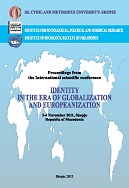THE DOMINANCE OF THE ENGLISH LANGUAGE IN THE EUROPEAN MULTILINGUAL MOSAIC THROUGH THE PRISM OF LINGUISTIC IDENTITY
THE DOMINANCE OF THE ENGLISH LANGUAGE IN THE EUROPEAN MULTILINGUAL MOSAIC THROUGH THE PRISM OF LINGUISTIC IDENTITY
Author(s): Saše Gerasimoski, Vesna TrajkovskaSubject(s): Language and Literature Studies
Published by: Институт за социолошки и политичко-правни истражувања
Keywords: language; identity; multilingualism; lingua franca; linguistic globalization
Summary/Abstract: The last few decades marked the expansion of the English language and its promotion into a world lingua franca, i.e. language of international communication, within the process of linguistic globalization. It has become official language of numerous international institutions and organizations which inevitably imposed its knowledge as a precondition for interaction at international level. This dominant position of English can be viewed from two aspects. On the one hand, it satisfies the need of world-wide speakers for using a mutually intelligible language that would facilitate communication and make it more efficient, while on the other hand the supremacy of a single language may seriously threaten linguistic diversity and the status of “smaller” languages whose inferior position may eventually lead to their loss of functions and domains of use. The paper focuses on the implications for the multilingual balance in Europe arising from the dominant status of English, bearing in mind the significance of language as symbol of identity particularly for members of smaller language communities. It is the authors’ view that the spread of English might affect the linguistic map of Europe and that only through fostering and maintaining a multilingual environment the existence of individual linguistic identities and their mutual recognition and affirmation as well as celebration of linguistic differences and intercultural understanding can be achieved.
Journal: Proceedings from the International scientific conference
- Issue Year: 2012
- Issue No: 1
- Page Range: 513-519
- Page Count: 7
- Language: English
- Content File-PDF

